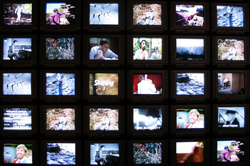
A few words on the Internet

It is evident that there exists a certain confusion about the fundamental concepts of public or mass informing and communication and their practical application. For example, the Law on Public Information uses the term "public media outlet" for what the constitution defines as "the media" or "means of public information". In accordance with the article 11 of the Law, public media outlets are newspapers, radio and TV programmes, news agency services, the Internet and other electronic editions of these public media outlets, as well as other means of public informing which use words, pictures and sound to publish ideas, information and opinions intended for public distribution to an arbitrary number of users.
However, radio and TV programmes and internet editions of newspaper articles and programmes (in radio broadcasting) are the media/means of public information, while newspapers and the Internet are the media/means of public communication. Generally speaking, communication is a necessary tool of informing, while informing is used to gain knowledge. News agency services are not public media outlets because such services are not intended for direct public distribution nor do they serve the public, but are delivered to owners of the means of public informing and communication.
The public or mass communication media include the following: newspapers, AM radio stations, FM radio stations, TV stations, cable distribution systems, multichannel multipoint distribution services, transponders for direct satellite broadcasting and the Internet – a new public communication media. The Internet is not an electronic edition of public media outlets, as the law states; it is a global or international telecommunication or electronic communication network that represents a combination of public and personal communication media.
Experts and the general public are mostly unaware of the fact that the information (the content) and communication (delivery of content) are inseparable, and that information has primacy over communication. In other words, there can be no information (content or knowledge) without communication, nor communication without information. It seems that the use of Internet improves the acquisition of knowledge as a set of interconnected and organized informations.
In the USA and other countries of the world it is officially considered, among other things, that dynamic development of internet services allows an extraordinary advance in availability of educational and informational resources, and that such interactive services offer a high degree of control over the received information, even more so in the future after further advances in technology. However, these official considerations can and should be debated.
At the same time, we should ask ourselves whether public informing via internet services conforms to the following quote: "Kant proved that knowledge is not a collection of gifts received from our senses and stored within our spirit serving as a museum, but that it is in a large degree the result of our own mental activity; that we have to actively research, compare, integrate and generalize if we want to acquire knowledge". (Karl R. Popper, "The Open Society and Its Enemies", Chapter 23, "The Sociology of Knowledge").
In any case, information and communication technologies have changed the society so much that it chose to call itself "the information society" – an economic and social system in which knowledge and information form the fundamental sources of progress and offer a chance for development to all countries (declaration of principles of the World Summit on Information Society, Geneva, 2003). The information society is seen as an embodiment of the Internet, just like in capitalism the consumer society is seen as an embodiment of the free market economy.
Dejan Popovic
MC Newsletter, June 4, 2010
View all comments (0) Leave a comment
Published comments contain opinions that are not the opinions of Media Center. Responsibility for the content of messages and their accuracy lies on the website users who posted them.
 |
| Ovaj tekst može da sadrži stav koji nije stav Medija centra. Odgovornost za sadržinu, kao i tačnost podataka, snosi autor teksta. |




